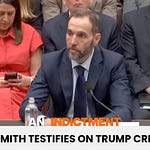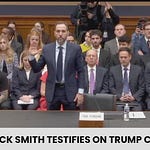The Senate voted 96-1 tonight to pass the Epstein Files Transparency Act. Tommy Tuberville of Alabama cast the lone vote against releasing the full archive of Justice Department files on Jeffrey Epstein’s operation.
Combined with yesterday’s 427-1 House vote, Congress has spoken with nearly unanimous force: the American public will see what the FBI knows about Epstein’s network. The bill now sits on Trump’s desk awaiting signature.
The release will be comprehensive—300 gigabytes of investigative files, flight logs, immunity agreements, internal communications, photographs, videos, and the complete record of Epstein’s 2019 death in federal custody. Everything the Justice Department holds on Epstein, his enablers, his business operations, and the decades-long cover-up that protected them all.
Trump declared publicly “we have nothing to hide” and directed Republicans to support the release. Yet for months his administration resisted this exact transparency. The contradiction frames the question: if there’s nothing to hide, why the months of resistance to showing it?
The files will expose what the FBI documented about Epstein’s connections across finance, politics, and media. They’ll reveal which powerful figures did business with him, who visited his properties, who benefited from his operations. The immunity deals that shielded co-conspirators. The internal communications that show who knew what, and when.
For survivors like Maria Farmer—who reported Epstein’s crimes to police in 1996 and again in 2006, only to watch justice denied across five presidential administrations—this represents vindication decades overdue. She testified to law enforcement in real time. They had what they needed to act. They chose not to.
The release connects to a broader pattern documented in The Greatest Heist investigation: a network spanning 40 years of financial extraction, from the S&L crisis through 2008 to today’s economic instability. The Epstein files may finally show how systematic wealth transfer operated behind the facade of legitimate business—$80 trillion extracted from the American economy while institutions looked away.
Trump’s $41 million purchase of Wexner’s Palm Beach mansion in 2004, flipped four years later for $95 million to Russian oligarch Dmitry Rybolovlev—that transaction appears in Epstein’s correspondence. Larry Summers stepped down from Harvard today over his documented requests for Epstein’s advice on his personal life. These are preliminary tremors from estate documents alone.
The FBI files will show the full architecture. Not speculation, but what federal investigators documented about how the operation functioned, who participated, and which institutions provided cover.
Whether Trump signs or attempts delay, the political calculus has shifted. When 523 members of Congress vote to force transparency, obstruction becomes untenable. The question is no longer whether the files emerge, but how quickly and how completely the Justice Department complies.
Thank you Rachel Hendricks, J’Lynn Davis, Sabrina Wood, Valerie DeFields, Laurel Fairchild, and many others for tuning into my live video! Join me for my next live video in the app.












